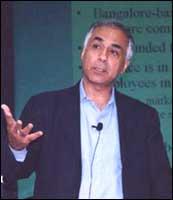|
|
| Help | |
| You are here: Rediff Home » India » Business » Interviews » Promod Haque, Managing Partner at Norwest Venture |
|
| ||||||||||||||||||||||||||||||||||||||||||||
|
| ||||||||||||||||||||||||||||||||||||||||||||
He believes deeply in entrepreneurship. Little wonder that he has been in this business for more than 45 years and nurtured over 350 companies (around 21 from India) during this period.
 The name is Promod Haque, managing partner at Norwest Venture Partners which manages over $1.8 billion in venture capital.
The name is Promod Haque, managing partner at Norwest Venture Partners which manages over $1.8 billion in venture capital.
It's only last December that Haque invested $13.8 million in Pune-based Persistent Systems. Ranked as a top 10 dealmaker on the annual Forbes Midas List for the past three years, Norwest focuses on investments in semiconductor and components, systems, software and services (the ones that primarily use the application service provider or ASP model rather than licenses).
Prior to Norwest, Promod spend 18 years in various operational roles, ranging from product development, marketing, chief operating officer and CEO at various public and private companies.
An electrical engineer from Delhi University, he also holds a PhD in electrical engineering from Northwestern University and an MBA from Kellogg, where he now serves on the advisory board. He was in Mumbai to announce the funding for an Indian online travel site. Leslie D'Monte caught up with him to find out what makes India tick for him.
Here are the excerpts:
This is the first time you appear to be looking at the B2C (business-to-consumer) segment. Earlier, your focus was on the B2B (business-to-business) segment.
If you see our portfolio, we have invested in the B2C segment in the past too. Of course, in India, this is the first such funding. The reason is that you see consumer spending growing since the middle class is growing. Internet usage is increasing.
We are looking at consumer services that are well-proven in the United States and Europe. Travel fits in our current strategy. We spent a lot of time understanding the travel space. We also identified a team in the UK and convinced them to come to India. We will be looking at several other consumer services in the near future.
What criteria do you adopt to identify the 'right' entrepreneurs?
The process is consistent. First, we look at large market opportunities. This comes from experience. Then we look at a solution for a service that is highly differentiated. Finally, we look for the 'big vision.' This does not mean we get it right every time. However, Norwest is backed by some hardworking, smart people (looks sideways at his partner Vab Goel). It's a team effort.
What advice do you have for today's entrepreneurs?
Today, you don't need a rich family to start a company. Indian entrepreneurs have an excellent opportunity to start companies with anywhere between $1-10 million and create one of the top 10 companies. All you need to have is a great idea, a good experienced (reiterates this) team and focus on the right investor. There is a certain amount of discipline and homework that needs to be done. We want to find these guys and back them.
How long does it take you to get a return on your investment?
Generally, around seven to eight years from the stage we get involved. Then a majority of the companies concerned either go public or get acquired.
You have been bullish on outsourcing in India. However, there has reportedly been a lot of backlash. Your comments.
What backlash are we talking about? I see no such thing. Frankly, it is a lot of hype. Most businesses understand the need to be competitive. Hence, outsourcing is a given.
You have always cautioned that rising salaries are detrimental to the competitiveness of Indian company since China could soon catch up. However, what's wrong with people making more money?
What I advocate is that India needs to change a few things in order to get competitive. The Israeli model is apt for India. People, of course, should join start-ups with the idea of making more money. That's how you will be able to attract better talent.
However, what I'm suggesting is that start-ups should offer stock options that will create more wealth for individuals, rather than salaries that add to the costs initially. The killing should be make in equity. I agree you need a mature stock market for this to happen. We also need to create an environment for NRIs to come back to India.
You have also exhorted a move beyond services to products. Do you see that happening soon enough?
The challenge for India is that there is not much happening in the product management space. In other words, you may know how to build a product. However, are you building the right product? Here is where a lot of returnees from Silicon Valley could add value in the product management methodology to find out what the consumer really wants.
What would you attribute your success to?
We have been in this for 45 years. We have a vast network of executives and a very good relationship with our customers. When we feel our hunch is right, we float it across a select network that has an implicit understanding of what we are looking for. This strategy always works.
Powered byMore Interviews
|
|
| © 2008 Rediff.com India Limited. All Rights Reserved. Disclaimer | Feedback |